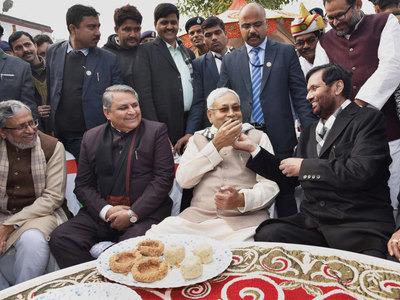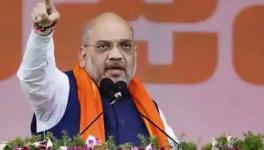Bihar Polls: Few Takers Among Dalits for Nitish Kumar’s Scheme of Giving Jobs When Kin is Murdered

Patna: Ahead of the Bihar Assembly polls, Chief Minister Nitish Kumar’s latest plan to provide government jobs to the kin of Scheduled Caste and Scheduled Tribe community members killed in the state is increasingly drawing flak from several quarters. After opposition party Rashtriya Janata Dal (RJD) and the ruling National Democratic Alliance’s ally Lok Janshakti Party (LJP), now dalits in Bihar are also questioning the CM’s move.
Unfazed by the uncertainty over his return to power, Nitish Kumar has played the "job card" for dalits, which is being described as a “masterstroke” by his party, Janata Dal-United. The move, on the other side, is being criticised by his rivals RJD, Congress and his own ally LJP, headed by Union Minister Ram Vilas Paswan.
Political watchers in Bihar say that Nitish Kumar’s move is purely a political one to counter Paswan, whose son Chirag, president of LJP, is not only targeting the state government repeatedly, but has also threatened to put up candidates against JD-U in upcoming polls, indicating a split in the alliance.
Meanwhile, Nitish Kumar has managed to convince former Bihar CM Jitan Ram Manjhi, president of the Hindustani Awam Morcha (HAM), to join the NDA after dumping the opposition’s Grand Alliance last week. Manjhi, a dalit leader like Paswan, could help JD-U to counter LJP.
MIFFED DALITS
Amid this political tug of war, dalits in the state are not ready to unquestionably accept Kumar’s “job card” in the event of the murder of their family members.
“It appears to be another jumla to woo dalits when the next Assembly election is near. Why should dalits be given jobs only after their kin is killed? It is useless and sounds like a mere promise to fool us,” says Vinod Manjhi, who belongs one of India's most marginalised dalit communities, Mushahar.
“We are illiterate and not trained in any skill; how will I get a job after one of my kin is killed?” asks Vinod who resides in Hasanpur Musahari located in the Phulwari Sharif block on the outskirts of Patna.
Like any other Musahari or Musahar Toli (a small, exclusive hamlet) of the Musahar community, Vinod’s locality is a poverty-stricken and foul-smelling ghetto of the most deprived and marginalised people. Musaharis have long been situated on the outskirts of villages inhabited by powerful, landed upper caste and backward caste communities in Bihar.
Vinod is a young, landless farm labourer who hardly received any benefits of government welfare schemes during the pandemic-induced lockdown because he does not have a ration card or an Aadhaar card.
“We are the poorest of the poor because those in power have ignored and neglected us. There is no concern for our children’s education, health and livelihood. Crores of rupees are spent in the name of our development, but hardly anything reaches us. We have been left to battle for survival. If the government was serious, it should have created a space for livelihoods by initiating a solid move.” He says.
Similarly, Munna Paswan, another dalit resident of Paswan tola in Arwal district‘s Rampur village, is also unhappy with the state’s move. “We don't want a job after our family member is killed. Is this the way to help us and empower us? It is a fact that dalits are poor, backward and struggle for their livelihood, but it makes no sense to provide a job only after our family member is killed.”
The latest announcement to give jobs to dalits is another example of how they are treated, says Munna. “Nitish Kumar has been in power since 2005 but joblessness is rampant among dalits and most of them have been forced to migrate outside Bihar to earn a livelihood. It was reflected during the lockdown as reverse migration resulted in dalits flooding into villages across the state.”
Munna says several migrant workers of his caste, who had returned in May-June during the lockdown, have gone back to their respective workplaces in other states. “There is nothing in Bihar for survival. There is no job opportunity. The government is beating the drum of development only through advertisement and propaganda,” he says.
Surendar Ram, a middle-aged dalit man who received education till Class 12th and resides in Gaya district, has failed to get a government job despite repeated attempts. He says, “If the Nitish Kumar-led government was really concerned about dalits, he should have announced that he will provide government jobs for all educated and unemployed dalits or those skilled in different works as per their abilities after his return to power.”
The government thinks a dalit family needs a job only after its member is killed, says Surendar, who earns his livelihood by doing odd jobs.
Asharfi Sada, president of the Musahar Vikas Manch, which works to raise awareness among Mushahars, says the state government has failed to improve the socio-economic condition of dalits, and especially that of Musahars.
“With the Assembly polls likely to take place in October-November, the chief minister suddenly realised from his inner voice that the government should provide a job to dalit persons in the wake of the murder of their family members. It is first of all not realistic and will not serve any purpose,” Asharfi says.
The landless dalit mushahars, derogatorily known as ‘rat eaters’ and subjected to untouchability even now, have not seen their socio-economic status change much in recent years.
“Earlier most of musahars were bonded labourer under the rich landed class, but now they are free from it. However, their life revolves around food, and hence, the search for work to earn a livelihood,” Asharfi explains.
PLIGHT OF MUSAHARS
In Bihar, 96.3% of musahars are landless while 92.5% work as farm labourers, according to the state Mahadalit Commission's interim report. Literacy in the community stands at an abysmal 9.8%, the lowest among dalits in the country. Moreover, less than 1% of musahar women are literate. The figures have not changed significantly since the 1980s.
The musahars’ plight can be imagined as they are still not allowed to live anywhere in Bihar except in hamlets earmarked exclusively for them. They live in unhygienic conditions, surrounded by pigs and open piles of garbage. They are still out of the mainstream society and live at the bottom, like the last man standing in a long queue.
Despite their poor conditions, dalits play an important part in the state’s politics. According to the 2011 Census, dalits constitute nearly 16 per cent of Bihar's 104 million population. The census has identified 21 of the 22 dalit sub-castes as mahadalits. They include musahar, bhuiyan, dom, chamar, dhobi and nat. The Paswan caste was left out of the mahadalit category at first and included later.
POLITICAL SLUGFEST
JD-U leader Sanjay Singh has defended Nitish Kumar saying he has done more for dalits than any other leaders in the country in the last decade. Bihar was the first state in the country to constitute a mahadalit commission for their overall development, he says.
But RJD leader Tejashwi Yadav said the CM’s move would encourage the killings of SC/ST people in the state. He has also asked why the people belonging to OBC and general categories have been left out of the scheme.
Echoing Tejashwi, LJP leader Chirag Paswan too targeted Nitish Kumar and demanded that government jobs be provided to family members of all dalits killed during the last 15 years of his rule.
Get the latest reports & analysis with people's perspective on Protests, movements & deep analytical videos, discussions of the current affairs in your Telegram app. Subscribe to NewsClick's Telegram channel & get Real-Time updates on stories, as they get published on our website.
























